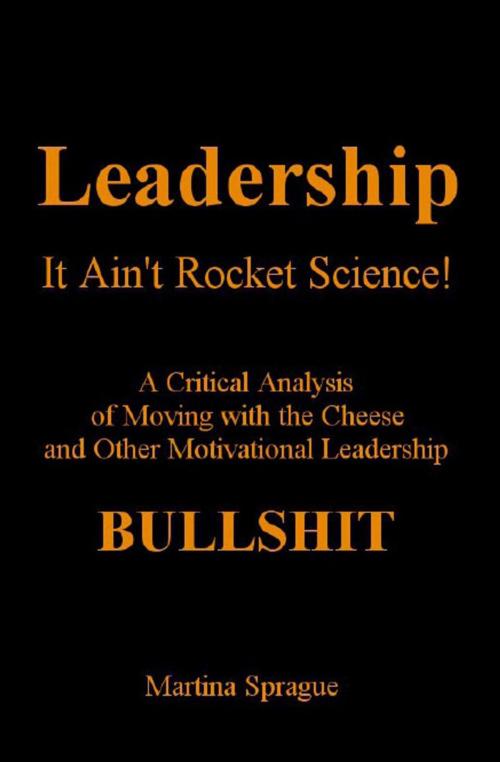Leadership: It Ain't Rocket Science: A Critical Analysis of Moving with the Cheese and Other Motivational Leadership Bullshit!
Business & Finance, Management & Leadership, Motivational, Leadership| Author: | Martina Sprague | ISBN: | 9781386898634 |
| Publisher: | Martina Sprague | Publication: | April 25, 2018 |
| Imprint: | Language: | English |
| Author: | Martina Sprague |
| ISBN: | 9781386898634 |
| Publisher: | Martina Sprague |
| Publication: | April 25, 2018 |
| Imprint: | |
| Language: | English |
"A book is like a mirror," said military historian Jay Luvaas. "If an ass looks in, no prophet can peer out." Although leadership books and popular slogans such as, "Today is the first day of the rest of your life," and, "You manage things but lead people," can aid thinking, the ability to know how to think rather than what to think may be the leader's greatest asset. Learning how to think involves a conscious element of skepticism. It requires awareness of biases related to previous experiences, strong personal views, or current ambitions. Groupthink, for example, tends to occur within a group of people who are trying to reach a consensus without applying critical thought and analysis.
There are literally hundreds of motivational leadership studies on the market that promise to reveal a new and innovative approach to leadership. But many of these books provide more hype than substance; they take a "fortune-cookie" approach by offering a checklist of old ideas repackaged under a new name, and cast very little fresh light on the problems the leader faces every day. Practicing leadership means more than wearing the "supervisor" patch. While the cliché, "there is nothing new under the sun," does have continuity, what one acquires is often a result of what one is searching for, and combinations of the old can give the appearance of originality while confirming views that we already hold.
American journalist Robert D. Kaplan observed that "[s]ome truths are so obvious that to mention them in polite company seems either pointless or rude. What is left unstated, however, can with time be forgotten." At its core leadership is about understanding human nature, but understanding human nature is also an essential key to controlling it. The purpose of this book is to debate that which is often left unstated and thus forgotten, and to conduct a critical analysis of leadership principles while simultaneously reminding the reader of the obvious. The book differs from other books on the subject by taking an analytical rather than motivational tack that is meant to stir at least some controversy and incite the reader to be honest with himself or herself when attempting to establish a leadership approach that works with his or her team. As will be demonstrated, anecdotes and metaphors for success can backfire by making the reader feel underappreciated, or worse, insulted and manipulated. The book is therefore equally much about provoking the follower to think about how he or she may recognize and sabotage, if he or she chooses, manipulative leadership behavior.
Chinese statesman and military leader Deng Xiaoping informed us that debate tends to make things "complicated." He was right, of course, but had likely only his own interests in mind. Readers of leadership books would be wise to approach their studies with the same caution a historian approaches his or her sources of information. You start by asking who wrote the book, what is his or her background, and what are the potential biases hidden within the text. What conviction does the author hold and what is he or she trying to achieve? Who is the primary beneficiary of the book?
Leadership, It Ain't Rocket Science: A Critical Analysis of Moving with the Cheese and Other Motivational Leadership Bullshit is a serious study of euphemistic leadership slogans and sayings, and the tendency that leaders have to cherry-pick historical accounts to justify their ideas.
"A book is like a mirror," said military historian Jay Luvaas. "If an ass looks in, no prophet can peer out." Although leadership books and popular slogans such as, "Today is the first day of the rest of your life," and, "You manage things but lead people," can aid thinking, the ability to know how to think rather than what to think may be the leader's greatest asset. Learning how to think involves a conscious element of skepticism. It requires awareness of biases related to previous experiences, strong personal views, or current ambitions. Groupthink, for example, tends to occur within a group of people who are trying to reach a consensus without applying critical thought and analysis.
There are literally hundreds of motivational leadership studies on the market that promise to reveal a new and innovative approach to leadership. But many of these books provide more hype than substance; they take a "fortune-cookie" approach by offering a checklist of old ideas repackaged under a new name, and cast very little fresh light on the problems the leader faces every day. Practicing leadership means more than wearing the "supervisor" patch. While the cliché, "there is nothing new under the sun," does have continuity, what one acquires is often a result of what one is searching for, and combinations of the old can give the appearance of originality while confirming views that we already hold.
American journalist Robert D. Kaplan observed that "[s]ome truths are so obvious that to mention them in polite company seems either pointless or rude. What is left unstated, however, can with time be forgotten." At its core leadership is about understanding human nature, but understanding human nature is also an essential key to controlling it. The purpose of this book is to debate that which is often left unstated and thus forgotten, and to conduct a critical analysis of leadership principles while simultaneously reminding the reader of the obvious. The book differs from other books on the subject by taking an analytical rather than motivational tack that is meant to stir at least some controversy and incite the reader to be honest with himself or herself when attempting to establish a leadership approach that works with his or her team. As will be demonstrated, anecdotes and metaphors for success can backfire by making the reader feel underappreciated, or worse, insulted and manipulated. The book is therefore equally much about provoking the follower to think about how he or she may recognize and sabotage, if he or she chooses, manipulative leadership behavior.
Chinese statesman and military leader Deng Xiaoping informed us that debate tends to make things "complicated." He was right, of course, but had likely only his own interests in mind. Readers of leadership books would be wise to approach their studies with the same caution a historian approaches his or her sources of information. You start by asking who wrote the book, what is his or her background, and what are the potential biases hidden within the text. What conviction does the author hold and what is he or she trying to achieve? Who is the primary beneficiary of the book?
Leadership, It Ain't Rocket Science: A Critical Analysis of Moving with the Cheese and Other Motivational Leadership Bullshit is a serious study of euphemistic leadership slogans and sayings, and the tendency that leaders have to cherry-pick historical accounts to justify their ideas.















